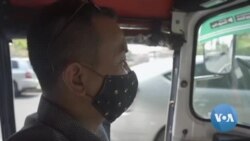ໃນຂະນະທີ່ຕົວເລກກໍລະນີການຕິດແປດໄວຣັສໂຄໂຣນາໃນ ກຳປູເຈຍ ໄດ້ເພີ່ມຂຶ້ນນັ້ນ, ທຸລະກິດຕ່າງໆທີ່ບໍ່ສາມາດທີ່ຈະປິດກິດຈະການ ແມ່ນໄດ້ປະກາດໃຊ້ມາດຕະການສຸຂະອະນາໄມທີ່ໄດ້ມາດຕະຖານຢ່າງເຂັ້ມງວດ ແຕ່ຍັງ ຄົງເປັນຫ່ວງ ກ່ຽວກັບ ອະນາຄົດ. ນັກຂ່າວວີໂອເອ ພອນ ໂບພາ ມີລາຍ ງານຈາກ ພະນົມເປັນ ແລະ ຄານ ໂສຄຸມໂມໂນ ເປັນຄົນຮ່າງລາຍງານນີ້, ເຊິ່ງ ພຸດທະສອນ ຈະນຳລາຍລະອຽດ ມາສະເໜີທ່ານໃນອັນດັບຕໍ່ໄປ.
ທ້າວ ດອນ ດີ, ຜູ້ທີ່ໄດ້ເປັນຄົນຂັບລົດຕຸກໆ ໃນນະຄອນຫຼວງຂອງ ກຳປູເຈຍ ມາເປັນເວລາ 10 ປີແລ້ວນັ້ນ, ໄດ້ເພິ່ງພາອາໄສລາຍໄດ້ທັງໝົດຂອງລາວຈາກ ຄ່າເດີນທາງ, ເຖິງແມ່ນວ່າ ລາວຈະສ່ຽງອັນຕະລາຍຈາກ ການລະບາດຂອງ ໄວຣັສ ໂຄໂຣນາ.
ທ້າວ ດອນ ດີ ຜູ້ທີ່ເປັນພໍ່ອາຍຸ 40 ຂອງລູກສອງຄົນເວົ້າວ່າ ລາວຈະໃສ່ໜ້າ ກາກອະນາໄມ ແລະ ຢາລ້າງມື ເພື່ອປ້ອງກັນຕົນເອງ ແລະ ຄວບຄົວຂອງ ລາວຈາກໄວຣັສ. ແຕ່ລາວບໍ່ຮູ້ວ່າມັນມີປະສິດ ທິພາບຫຼາຍປານໃດ.
ທ້າວ ດອນ ດີ ກ່າວວ່າ “ລຸນຫຼັງຄຳແນະນຳຈາກກະຊວງສາທາລະນະສຸກ, ຂ້າ ພະເຈົ້າໄດ້ໃຊ້ສະບູ ແລະ ເຫຼົ້າເພື່ອທຳຄວາມສະອາດ. ຫຼັງຈາກລູກຄ້າ ຈ່າຍ ເງິນ, ຂ້າພະເຈົ້າຈະສີດເຫຼົ້າໃສ່ມືຂອງຂ້າ ພະເຈົ້າ ແລະ ເງິນທີ່ຫາກໍໄດ້ຮັບນັ້ນ. ແລ້ວ ຂ້າພະເຈົ້າກໍຈະສີດເຫຼົ້າໃສ່ບ່ອນນັ່ງທາງຫຼັງ.”
ໄວຣັສໂຄໂຣນາສາຍພັນໃໝ່ ຫຼື COVID-19, ໄດ້ລະບາດອອກຈາກເມືອງ ວູຮານ ປະເທດ ຈີນ ໃນເດືອນທັນວາ 2019, ແລະ ຕອນນີ້ໄດ້ແຜ່ລະບາດ ໄປທົ່ວໂລກຢ່າງວ່ອງໄວ.
ໃນ ກຳປູເຈຍ, ມີລາຍງານຫຼາຍກວ່າ 100 ກໍລະນີ. ປະເທດດັ່ງກ່າວໄດ້ປິດ ໂຮງຮຽນ, ຫ້າມຄົນຕ່າງປະເທດຈາກການເດີນທາງເຂົ້າ ແລະ ໄດ້ຮັບຮອງເອົາ ມາດຕະການປ້ອງກັນເຊັ່ນໃສ່ໜ້າກາກອະນາໄມ, ລ້າງມື ແລະ ປະຕິບັດການ ຢູ່ຫ່າງກັນໃນສັງຄົມ.
ສຳລັບເຈົ້າຂອງທຸລະກິດ ຜູ້ທີ່ຊີວິດການເປັນຢູ່ຂອງເຂົາເຈົ້າ ອາໄສກັບການເປີດ ກິດຈະການໄວ້ນັ້ນ, ມາດຕະການປ້ອງກັນຕ່າງໆ ແມ່ນການປ້ອງກັນພຽງຢ່າງ ດຽວຂອງເຂົາເຈົ້າ.
ທ່ານ ໂນມ ໂບອຶນ, ຜູ້ຮັກສາຄວາມປອດໄພຮ້ານຂາຍເຄື່ອງສຳອາງກ່າວວ່າ “ນີ້ ແມ່ນເຈລສຳລັບທຳຄວາມສະອາດມື ແລະ ນີ້ແມ່ນສຳລັບການວັດແທກອຸນ ຫະພູມຫ່າງກາຍ. ຖ້າອຸນຫະພູມຂອງລູກຄ້າສູງກວ່າ 37.5 ອົງສາແຊລຊຽດ, ຂ້າພະ ເຈົ້າຈະບອກໃຫ້ເຂົາເຈົ້ານັ່ງລົງ, ແລະ ກວດອຸນຫະ ພູມຂອງເຂົາເຈົ້າຄືນ ໃໝ່. ຖ້າອຸນຫະພູມຍັງຄືເກົ່າ, ຂ້າພະເຈົ້າຈະຂໍໃຫ້ເຂົາເຈົ້າໄປໂຮງໝໍ.”
ທ້າວ ພອນ ພວນ, ພະນັກງານຮ້ານຊຸບເປີມາເກັດ ກ່າວວ່າ “ຖ້າລູກຄ້າເຂົ້າມາ ໃນຮ້ານຂອງພວກເຮົາໂດຍບໍ່ໃສ່ໜ້າກາກ, ພວກເຮົາຈະອະທິບາຍໃຫ້ເຂົາເຈົ້າຮູ້ ວ່າ ພວກເຮົາຕ້ອງຮັບປະກັນຄວາມປອດໄພຂອງພະນັກງານຂອງພວກເຮົາ ແລະ ລູກຄ້າເອງ. ພວກເຮົາຈະຂໍໃຫ້ເຂົາເຈົ້າຊື້ໜ້າກາກຂອງພວກເຮົາລາຄາ 25 ເຊັນຢູ່ປະຕູ, ແລະ ຖ້າພວກເຮົາໝົດໜ້າກາກ, ພວກເຮົາຈະຂໍໃຫ້ເຂົາ ເຈົ້າ ຊື້ຢູ່ຮ້ານອື່ນ ກ່ອນທີ່ຈະໃຫ້ເຂົາເຈົ້າໄປໃນຮ້ານ.”
ໃນຂະນະທີ່ເຈົ້າຂອງທຸລະກິດຫຼາຍສິບຄົນໄດ້ປິດຮ້ານຂອງເຂົາເຈົ້າໃນ ພະນົມ ເປັນ ເພື່ອຈຳກັດໂອກາດໃນການຕິດແປດໄວຣັສນັ້ນ, ຫຼາຍຄົນອື່ນໆແມ່ນບໍ່ສາ ມາດທີ່ຈະເຮັດແນວນັ້ນ.
ທະນາຄານໂລກ ໄດ້ລາຍງານວ່າ ປະຊາຊົນ ກຳປູເຈຍ ປະມານ 13 ເປີເຊັນ ແມ່ນອາໄສຢູ່ໃນຄວາມທຸກຍາກ. ດ້ວຍການປະກັນສັງຄົມທີ່ມີຢູ່ພຽງເລັກນ້ອຍ ແລະ ປະຊາຊົນສ່ວນຫຼາຍແມ່ນມີທຸລະກິດຂອງຕົນເອງນັ້ນ, ປະຊາຊົນຫຼາຍຄົນ ແມ່ນອາໄສລາຍໄດ້ປະຈຳວັນຂອງເຂົາເຈົ້າ.
ທ້າວ ດອນ ດີ ຄົນຂັບລົດຕຸກໆ ເວົ້າວ່າ “ຂ້າພະເຈົ້າຢ້ານໄວຣັສນັ້ນ. ແຕ່ຖ້າ ຂ້າພະເຈົ້າຫາເງິນບໍ່ໄດ້, ເມຍ ແລະ ລູກຂອງຂ້າພະເຈົ້າກໍຈະບໍ່ມີເຂົ້າກິນ. ຂ້າ ພະເຈົ້າຕ້ອງໄດ້ອອກມາ ແລະ ຮັບເອົາຄວາມສ່ຽງ.”
As the number of coronavirus infection cases rises in Cambodia, businesses that cannot afford to close enact strict hygiene standards but remained worried about the future. From Phnom Penh, VOA’s Phorn Bopha and Khan Sokummono filed this report, narrated by Chetra Chap.
Dorn Dy, who has been a Tuk Tuk driver in Cambodia’s capital for the past 10 years, depends entirely on the income he earns from his fares, even though he risks danger from the coronavirus pandemic.
The 40-year-old father of two says he uses masks and hand sanitizers to protect himself and his family from the virus. But he doesn’t know how effective they are.
“Following the advice from the Ministry of Health, I use soap and alcohol to clean. After my clients pay me, I spray alcohol on my hands and the money I’ve just received. And then I spray the back seats with alcohol.”
The novel coronavirus disease, or COVID-19, broke out of Wuhan, China, in December 2019, and has now quickly spread globally.
In Cambodia, more than 100 cases have been reported. The country has closed schools, banned foreign nationals from entering, and adopted preventive measures such as wearing masks, washing hands and practicing social distancing.
For some business owners whose livelihood depends on staying open, the preventive measures are their only protection.
“This is for hand sanitizing and this is for measuring body temperature. If the customers’ temperature is more than 37.9 degree Celsius, I ask them to sit down, and re-check their temperature. If the temperature stays the same, I ask them to go to the hospital.”
“If customers come to our shop without wearing a mask, we explain to them that we need to secure the safety of our staff and the customers themselves. We ask them to buy our 25-cent mask at the door, and if we are out of masks, we ask them to buy one at another store before we let them in our shop.”
While dozens of business owners have closed their shops in Phnom Penh to limit the chances of infection, many others cannot afford to do so.
The World Bank reports that about 13 percent of Cambodians live in poverty. With little social insurance available and most the population being self-employed, many Cambodians are dependent on their daily income.
For Dorn Dy, even parking his Tuk Tuk at home poses a risk for his family.
“I’m scared of the virus. But if I don’t make money, my wife and my kids have no rice to eat. I have to go out and take risks.”





